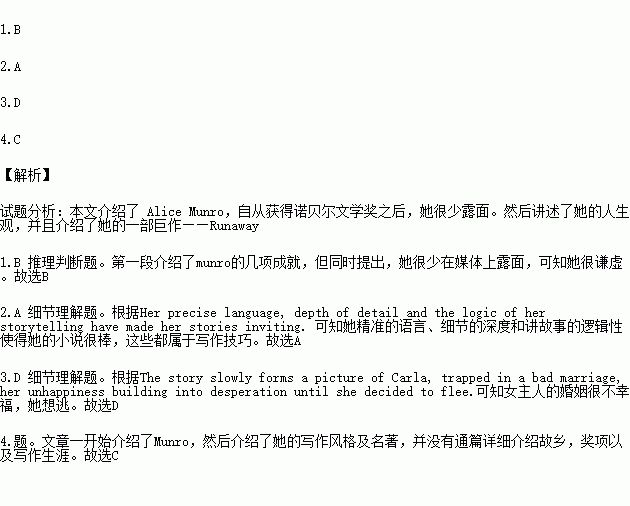题目内容
It’s hard to find Alice Munro in the media. Even after she won the 2013 Nobel Prize in Literature, the Canadian writer just appeared for a quick interview and then dropped out of sight. On Dec 29, she still didn't seek the spotlight(聚光灯)when she was named one of the five Women of the Year by the Financial Times.
In Munro's eyes, ordinary lives always hide larger dramas. So she records what we casually think of as the everyday actions of normal people. She often focuses on life in her hometown, a small village in Ontario which she is most familiar with. She writes about the ordinary things in the village-fox forming, trees filled in the Ontario wilderness, poor country alcohol and long last illnesses. Above all, she talks about girls and women who have seemingly ordinary lives but struggle against daily misfortune.
She has a special talent for uncovering the extraordinary in the ordinary. These are ordinary people, ordinary stories, but she has the magic. Her precise language, depth of detail and the logic of her storytelling have made her stories inviting.
Runaway, one of Munro’s representative works, is a good example of her writing style. One of the stories centers on the life of an ordinary woman Carla, who lives in a small Canadian town with her husband Clark. The story slowly forms a picture of Carla, trapped in a bad marriage, her unhappiness building into desperation until she decided to flee. The story of Carla is a story of the power and betrayals of love. It is about lost children and lots of chances that we can all find in life, There is pain beneath the surface, like a needle in the heart.
Since she published her first collection of short stories in 1968, Munro has won many awards, with the Nobel Prize being her biggest honor. On Oct 10, 2013, the Nobel Prize committee named Munro the “master of the contemporary short story”.
1.We learn from Paragraph 1 that Alice Munro_____
A.didn't get on well with the media
B.remained modest though very successful
C.didn’t value the title of Women of the Year
D. was surprised at winning the Nobel Prize
2.What makes Alice Munro’s stories fascinating according to the text?
A.Her writing techniques
B.The complicated plots
C.The humorous language
D.Her rich imagination
3.In her representative work Runaway, Carla_____
A.leads a happy life with Clark
B.is a faithful wife to her husband
C.loses all hopes for a better life
D.tries to run away from her husband
4.What is the text mainly about?
A.Alice Munro and her hometown
B.The awards Alice Munro won
C.Alice Munro and her writing style
D.Alice Munro’s literary life
Here are the comments on CRI (China Radio International) given by people from different countries on the Internet.
People | Comments |
Yingtian Hu Guangzhou, China | This is the first time that I participate in CRI. And I like it very much. I hope its website will become the most excellent one with the foreign languages. And I choose the important news which I think has a great influence on our society and our lives. In the end, I hope that more and more persons join in CRI and make it perfect! |
SujanParajuli, Select city, Nepal | I am both a regular listener of CRI and visitor of its wonderful Website. First of all, I would like to extend my heartfelt thanks to CRI for its great efforts to keep the listeners up-to-date during the year 2008. We, the listeners, are greatly grateful to CRI for its praise-worthy efforts to quench the thirst of its dear listeners. During the Year 2008, I found all of your programs quite interesting, informative and educational. Once again, thanks a lot for offering lots of information, news, entertainment and many items which have indeed broaden the horizons of our knowledge and understanding as well. |
Ibrahim Rustamov, Tajikistan | With CRI, I was impressed by China’s rapid development in all spheres. But I felt so sorry to get to know about the snowstorms in China and Wenchuan earthquake. CRI and CCTV play a great role in introducing China to the world! Kudos! My friends and I wish CRI all the best! |
Mike Thatcher, London | My family and I are all keen on Chinese Culture, especially the beautiful Chinese folk music. Various interesting programs by CRI just open a window for us foreigners, through which we can know more about China and have a better understanding of the Chinese culture. Best wishes to CRI! Best wishes to China! |
1.Which of the following benefits of CRI is NOT mentioned above?
A. CRI helps to keep its listeners up-to-date.
B. CRI helps its listeners to better understand China.
C. CRI helps its listeners to practice and improve foreign languages.
D. CRI helps its listeners broaden their knowledge with its rich contents.
2.The underlined phrase “quench the thirst” refers to _____.
A. satisfy one’s need
B. supply drinks
C. take care of
D. keep in touch with
3.What can be concluded from the four comments?
A. CRI has a great influence on our society and lives.
B. Wonderful though CRI is, there are still many weaknesses.
C. CRI plays an important role in introducing the world to China.
D. CRI has made great efforts to make itself better and gained popularity.

